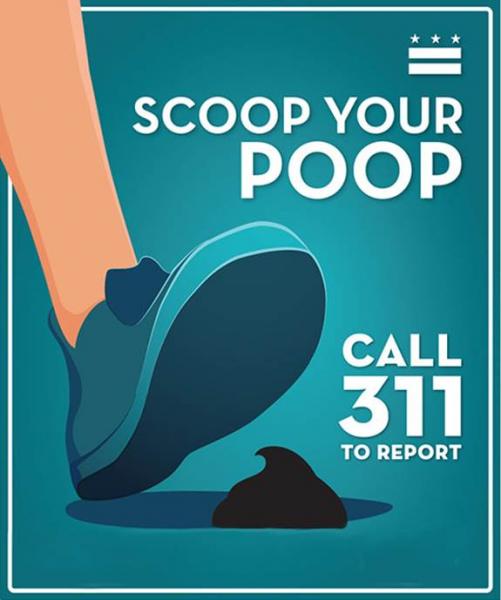 Pet waste contains harmful bacteria and parasites that make people and pets sick. When it is left outside, pet waste can be tracked into homes and cars or washed into our streams and rivers.
Pet waste contains harmful bacteria and parasites that make people and pets sick. When it is left outside, pet waste can be tracked into homes and cars or washed into our streams and rivers.
DOEE provides technical support and assistance with education on the environmental impacts of pet waste in coordination with the Mayor’s Office of the Clean City, which leads the District’s response to pet waste issues.
Report:
Pet waste complaints should be submitted to DC 311. The online form can be found at 311.dc.gov under All Service Requests > Pet Waste. Residents can also submit complaints by phone by dialing 3-1-1. This information is used to identify hotspots to target for outreach and education.
Take Action:
Everyone:
- Tell your family and friends to pick up after their pets. You can find an outreach flyer below.
- Share bags. Hand out pet waste bags or make them available to your neighbors in case someone forgets to bring their own.
- Post a sign. Buy, make your own, or print the sign at the bottom of this webpage. The District does not post signs by request.
Pet Owners:
- Keep your yard clean by picking up dog poop every day. Throw your pet’s waste in the trash or flush it down the toilet. Do not use dog poop as compost because backyard compost piles typically do not get hot enough to kill the bacteria and potential diseases it contains.
- Carry disposable plastic bags with you on walks, and bring extras just in case. Pet waste bags don’t have to be fancy; try reusing old grocery, bread, produce, or newspaper bags.
- Never throw or leave bags of poop on the ground or stormdrain.
- Set a good example to other dog owners. If you see someone else’s dog poop on the ground pick it up, and if you notice another dog owner that needs a bag offer them one of your own.
Pet Waste Facts:
Pet waste is bad for our health. Pet waste contains bacteria and parasites that infect people and pets including food poisoning, tapeworm and hookworm. These diseases can be especially dangerous for children, elderly, and people who have compromised immune systems. A dime’s worth of dog poop contains 23 million fecal coliform bacteria, such as E. coli. Some diseases that are found in pet waste can stick around in the soil for over a year and contribute to making our waterways unsafe for swimming. Pet waste can attract pests like flies, roaches and rats which also carry diseases.
Pet waste is bad for the environment. Decaying pet waste can release ammonia and other pollutants into the water causing algae blooms that use up oxygen and harm fish and other aquatic life.
Pet waste piles up. While leaving one poop behind might not seem like a lot, it adds up. A typical 40 pound dog makes about 274 pounds of dog poop each year. Collectively, dogs in the District make about 44 million pounds of poop each year, roughly the weight of three Capitol Domes. Every scoop counts.
Under District law, all dog walkers are required to pick up their dogs’ poop unless it is a seeing eye dog. More information can be found in the municipal regulations (24 DCMR 900.7 – 900.8)

